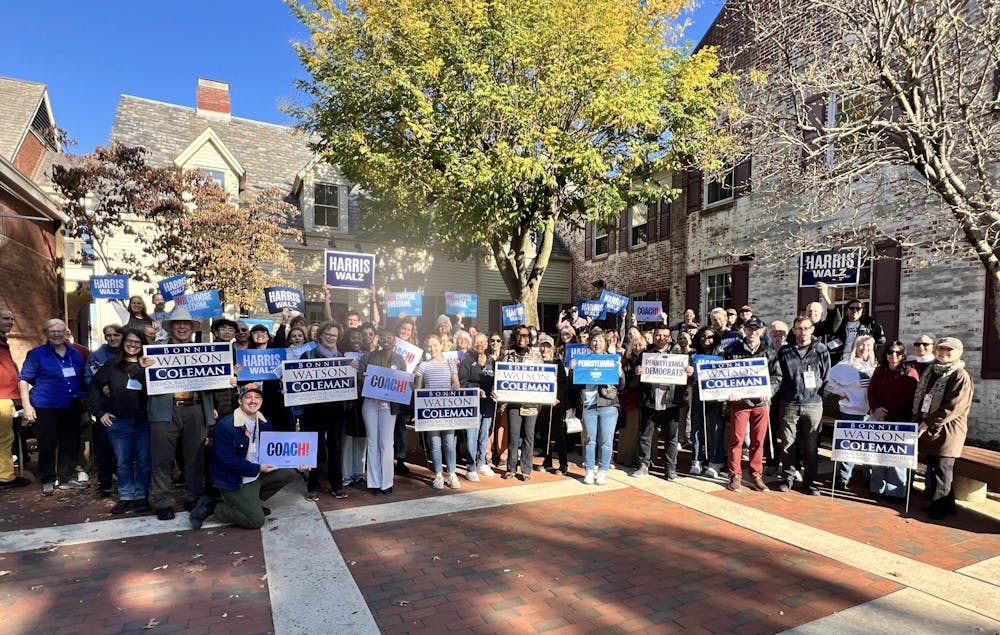Members of Princeton College Democrats knocked on more than 5,000 doors in the lead-up to the presidential election, including almost 3,600 in Pennsylvania for Vice President Kamala Harris and Senator Bob Casey (D-Pa.). Despite the efforts of Princeton students and other canvassers’ efforts, Pennsylvania voted Republican in the presidential election and Casey lost the Senate seat that he has held since 2006.
“I think that the Harris campaign actually probably did the best they could, and that the volunteers who were there did the best they could,” Michelle Miao ’26, president of Princeton College Democrats, told The Daily Princetonian. “Kamala Harris was competitive where it mattered, and I believe that it had something to do with this door-to-door conversation and phone calls that were being made.”
Miao is a News contributor for The Daily Princetonian.
Despite the loss, Nate Howard ’25, president of College Democrats of New Jersey, expressed confidence in Harris’s campaigning work.
“Kamala Harris’s presidential campaign made tremendous inroads in the states they targeted, which is why the swings from 2020 were far less pronounced in those states.”
“The ground game for Harris was strong. We made millions of calls, talked to millions and millions of voters,” Lake Liao ’27, a field organizer for the Harris Climate Team, told the ‘Prince.’ “We see in the data that the places where we were on the ground talking to those voters … she did perform better in those areas.”
However, in response to the election results, Liao said confidently that “we could see it coming.”
“It was not surprising that when I spoke to people in person, knocking on their door, in suburban and rural Pennsylvania, a lot of working-class people said, ‘I’m really concerned that my grocery prices have gone up’ or ‘I can’t afford eggs and vegetables.’”

Liao felt these were “ubiquitous and universal grievances,” which led him to believe that “It was likely that they would want change, regardless of what that change is. And that’s Trump.”
Since early September, Liao had been involved in canvassing, including identification, persuasion, and get-out-the-vote campaigns, in both Bucks County, Pa. and New Jersey’s 7th congressional district, a contested district in the race for the House.
Harris lost Bucks County by just over 1,000 votes, becoming the first Democratic president to lose the county since Michael Dukakis in 1988. Additionally, Sue Altman, the Democratic nominee for New Jersey’s 7th congressional district, also lost.
Nicholas Urbati ’25, who also canvassed in Pennsylvania and New Jersey, had a different experience to Liao’s on the doorstep.

“It seemed like the momentum was on our side with every positive conversation, but in the end, the results did not pan out as hoped on election day.”
Despite these contrasting experiences, students agreed about the value in canvassing.
“We were in purple districts, so especially earlier on with the persuasion period, we did get a range of people who were voting for Trump … it really helped us understand what the ground game was like in such a key state,” Miao shared. “To really understand American politics, you can’t really just … read about it. I think you have to go out and meet the electorate and realize that these are the key voters who are going to decide the election, and that, however shocking their views are, it is what America thinks, so I don’t think the work was for nothing.”
Howard also interacted with voters on both sides of the spectrum and felt similarly. Not only did he “talk with undecided voters … to share reasons to support Harris,” but he also “had the opportunity to talk with Trump voters to better understand their perspectives.” He explained that “when someone told me they supported Trump, I would ask them why, empathize with their concerns, shake their hand, and wish them a good afternoon.”
“It doesn't fully bridge our divides, but I think those kinds of interactions are the starting point,” Howard added.
Urbati felt that disappointing results “should not deter anyone: in democracy, you win some elections and lose others. My commitment, alongside many others, to building a better America remains unwavering.”
Despite this, Liao also saw this election as highlighting the need for a shift in Democrats’ overall approach to politics and elections.
“We need to retool the way we think about politics as a materialist exercise, rather than something that relates to values or pursuing justice,” he said.
Miao expressed a similar need for action.
“I think that the true test now is just how much we’re willing to fight for what we believe in and fight for the future and look to what we can do to organize and resist and bring out the best of America.”
Ethan Caldwell is a staff News writer for the ‘Prince.’
Please send any corrections to corrections[at]dailyprincetonian.com.








